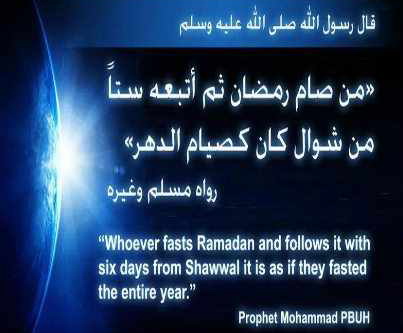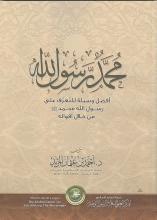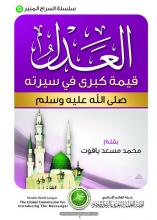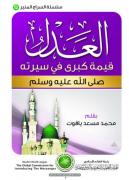The Prophet of Mercy Website
Muslim World League - Global Commission for Introducing the Messenger
A value in his biography (blessing and peace be upon him)
By Mohammad Mos’ad Yaqut
Britney Saint Helier described the Prophet (blessing and peace be upon him): "There are two traits in his character, the noblest traits that the humankind have, which are justice and mercy." [1]
The Prophet (blessing and peace be upon him) acquired justice in the smallest details of his daily life, with strangers and relative, in travel and urban, as debtor and creditor... But we see him positive when he participated in founding a charitable association concerned with the confession "adoption" of justice and defending the oppressed! (Curiosity Alliance) The Prophet (blessing and peace be upon him) praised and said: "When I was young I witnessed Al-Mutaibin "generous people" Alliance with my uncles, that alliance was better to me than the best type of camels."[2]
Models of justice in his Sunnah and conducts:
Firstly, his warning of enslavement of people:
The Prophet (blessing and peace be upon him) implanted the value of justice in his followers, he said a warning of enslavement of people: “Not one of you say to my servant "slave" and to my female servant "female slave", all of you and all your wives be servants of Allah, but say my lad and my maid and my young and my young girl.”[3]
Secondly, his banning of racial discrimination:
He said: "You are sons of Adam, and Adam came from dust. Let the people cease to boast about their ancestors. They are merely fuel in hell; or they will certainly be of less account with Allah than the beetle which rolls dung with its nose.” [4] The Prophet (blessing and peace be upon him) ranted severely with Abu Dhar when he mocked the mother of Bilal. [5]
Thirdly, justice between the sons and daughters:
The Prophet (blessing and peace be upon him) refused to testify for Al-Nu’man Ibn Basheer when his father came and wanted the Prophet to testify that the man do not treat his children fairly by a gift, and the Prophet said to the father: "So you do not let me witness, I do not bear witness to injustice." [6]
The Prophet (blessing and peace upon him) said: "Fear Allah and treat your children fairly." [7]
Fourthly, his justice with Non – Muslims:
Ibn Abi Hadrd narrated, he was a debtor to a Jew, he attacked him, the Jew was complaining to the Messenger of Allah (blessing and peace be upon him):”O Mohamed, I lent him four Dirhams, and he did not give me them! The Prophet (blessing and peace be upon him) - ordering the Muslim to pay - said: "Give him his right." [8]
Verses were revealed from heaven to acquit the Jewish accused by some Muslims, in a long story: Allah Almighty said: "Surely we have sent down to you the Book (this Qur’an) in truth that you might judge between men by that which Allah has shown you (i.e. has taught you through the Divine Revelation), so be not a pleader to the treacherous.” [9] (An-Nisa, 4:105).
Fifthly, all people are equal before the law:
When the nobles of Quraish wanted to exclude the woman from Bani Makhzum tribe from the application of the provision as she stole, the Prophet (blessing and peace be upon him) upbraided Osama, and said in this situation: "By Allah, if Fatimah the daughter of Mohamed "the Prophet" stole, I would cut her hand!" [10]
Sixthly, his justice among the community`s factions, during two examples,
1 – His justice between Bani Qurayza and Bani An-Nadir in the matter of blood money:
The Jewish factions sued him, the Jews oppressed each other in the blood money, Bani Al–Nadir was stronger than Bani Qurayza, so they imposed on them a double blood money for their killing, Bani Qurayza refused to pay the blood money when Islam came into Medina, and demand justice in the blood money and brought each other before the Prophet of Mercy, he treated them with justice.[11]
2- His fairness among the faction in the issue of irrigation and distribution of water:
The people of Mahzor [12] from Bani Qurayza came to him and resort to him to judge in the problem of water and irrigation, he judged and equalized with them in the division.
Tha’laban ibn Malik reported that he heard a man from Quraish who had a share with Bani Qurayza and he complained to the Prophet (blessing and peace be upon him) about a well that they share its water. So, Allah’s Messenger (blessing and peace be upon him) judged that water should be distributed fairly. [13]
Seventhly, the principles of equality and justice in the farewell ceremony:
The farewell ceremony is considered a great constitution and a social contract in establishing justice among people, Herbert George Walls [14] comments on this ceremony saying: "The first paragraph declares what happens among the Muslims from plundering, looting and revenges and the last paragraph makes the Negro "black" believer equal to the Caliph... it has found great principles for the noble fair treatment in the world.”[15]
Eighthly, his justice between the ruler and the subjects:
The value of justice culminates was in its peak, when the Prophet (blessing and peace be upon him) let some of his companions take revenge on him, this Sawad Ibn Ghazia, when was going out of the row on Bader Day, the Prophet (blessing and peace be upon him) did slightly touch his belly – by the arrow that we do not reach for it – and said: "Stand in the row!” He said: “O the Messenger of Allah! You caused pain to me! And Allah has sent you by right and justice gives me right!” The Prophet (blessing and peace be upon him) uncovered his belly and said: "Retaliate." [16]
These examples are mentioned by the Prophet (blessing and peace be upon him) in the Sunnah and behavior declares how the ethics of justice were clear in his conduct, whether he was a teacher, a father, a leader or a ruler.
May Allah’s peace and pray be upon Mohamed, his family, his companions and his followers until the Day of Judgment.
An Egyptian preacher and researcher and a member of the world federation for Muslim scholars and the manager of editing www.theprophetmercy.com
E-mail: Yakoute @gmail. Com
E –website: www. Yakot .com
Telephone: 002 0122885240 - 00 2 010 44 20539
Address: Balim, through the resort, behind the Development Bank, Egypt.
[1] Britney Saint Helier, the eastern people and their creeds, p. 39.
[2] Reported by Ahmad, no. (1567) and it is in the sound chain of Imam Al-Albani, no. 1900).
[3] Reported by Muslim, no. 6011.
[4] Reported by Abu Dawud, no. 5118 and Al-Albani graded it as sound.
[5] Reported by Al-Bukhari, no. 29.
[6] Reported by Al-Bukhari, no. 2456, and Muslim, no. 3056 and the text is for Imam Muslim.
[7] Reported by Al-Bukhari, no. 2398.
[8] Reported by Imam Ahmad, no. 14942 and Al-Albani cited it in the sound chain, no. 2108.
[9] Reported by At-Termidhi, no. 296 and Al-Albani graded it as sound.
[10] Reported by Al-Bukhari, no. 3475, and Muslim, no. 4505.
[11] Reported by Abu Dawud, no. 3591, An-Nasai, no. 4733, and Al-Albanin graded it as fair.
[12] This is a name of a valley of Bani Qurayza.
[13] Reported by Ibn Majah, no. 2481, Abu Dawud, no. 3638, and Al-Albani graded it as sound.
[14] Herbert George Walls (1866-1946), a famous British writer, and the author of the book titled: Features of the human history.
[15] Herbert George Walls, Features of the human history, vol. 3, p. 640-641.
[16] Reported by Abu Dawud, no. 4538, An-Nasai, no. 4791, and Al-Albani cited it in the sound chain of traditions, no. 2835.
| Attachment | Size |
|---|---|
| justice.doc | 40 KB |








